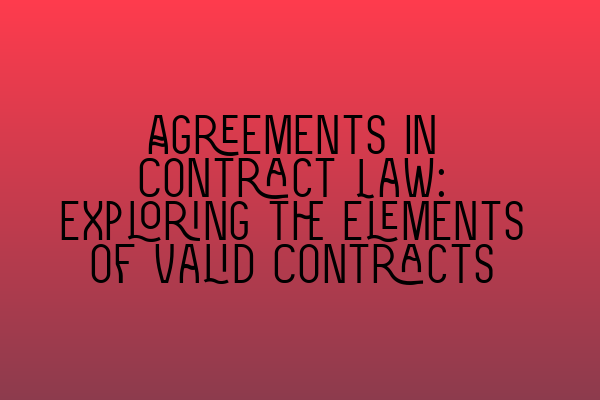Agreements in Contract Law: Exploring the Elements of Valid Contracts
In the world of contract law, agreements play a fundamental role. It is through agreements that parties enter into legally binding contracts, setting forth the rights and obligations of each party involved. Understanding the elements of valid contracts is crucial for both solicitors and individuals engaging in contractual relationships. This article will provide a comprehensive overview of the essential elements required to form a valid contract.
Before diving into the elements, let’s first define what a contract is. A contract is a legally enforceable agreement between two or more parties that creates an obligation to do or not to do a particular thing. It is important to note that not all agreements are legally binding contracts. To be legally enforceable, an agreement must satisfy certain conditions.
1. Offer and Acceptance
The first element of a valid contract is the existence of a clear and definite offer by one party and an unambiguous acceptance by the other party. An offer is a proposal made by one party indicating their willingness to enter into a contract. Acceptance, on the other hand, is the unequivocal expression of the offeree’s consent to be bound by the terms of the offer.
It is important to distinguish between an offer and an invitation to treat. An invitation to treat, such as an advertisement or a price list, is not an offer but an invitation for others to make an offer. The acceptance of an invitation to treat does not create a contract but rather an offer.
2. Intention to Create Legal Relations
For an agreement to be considered a contract, there must be an intention by the parties to create a legally binding relationship. In other words, the parties must have the intention that their agreement will be enforceable by law. While this intention is presumed in commercial agreements, it may not be presumed in social or domestic arrangements.
It is worth mentioning that certain agreements, such as those made in a social context or between family members, may be presumed to lack intention to create legal relations. However, this presumption can be rebutted by providing evidence to the contrary.
3. Consideration
Consideration is the third essential element of a valid contract. Consideration refers to something of value that is exchanged between the parties to a contract. It can be in the form of money, goods, services, forbearance, or a promise to do or not to do something. Consideration is what distinguishes a contract from a gift or a one-sided promise.
Consideration must be sufficient but need not be adequate. This means that the value of the consideration does not have to be equal to the value of what is promised in return. As long as there is some form of consideration, the requirement is fulfilled.
4. Capacity
In order to form a valid contract, the parties involved must have the legal capacity to enter into a contract. This generally means that they must be of a certain age (usually 18 or over) and must possess the mental capacity to understand the nature and consequences of the contract they are entering into.
Certain individuals, such as minors, individuals with mental disabilities, and individuals under the influence of drugs or alcohol, may lack the capacity to enter into a contract. However, there are exceptions and protections in place for individuals in these categories, which may vary depending on the jurisdiction.
5. Legal Object
The final element of a valid contract is the requirement that the object or purpose of the contract must be legal. Contracts that involve illegal activities, infringe on public policy, or are contrary to the law are generally considered void and unenforceable.
It is important for solicitors and individuals to ensure that the subject matter of the agreement is legal and does not violate any applicable laws or regulations. If the object or purpose of the contract is illegal, the agreement will be deemed void ab initio, meaning it is treated as if it never existed.
In conclusion, valid contracts require the presence of certain essential elements to be legally enforceable. These include offer and acceptance, intention to create legal relations, consideration, capacity, and a legal object. Understanding these elements is crucial for both solicitors and individuals engaging in contractual relationships.
If you found this article helpful, you may also be interested in the following related articles:
– Barrister vs. Solicitor: A Comprehensive Comparison
– Exploring Different Solicitor Specializations: Finding Your Niche
– Embracing the Rise of Virtual Law Practices
– Navigating the Maze: Demystifying Ethical Responsibilities of Solicitors
– Unveiling Real-Life Case Studies: Insights into Legal Practice and Decision-Making
Feel free to explore these articles to expand your knowledge and gain more insights into the legal profession.
